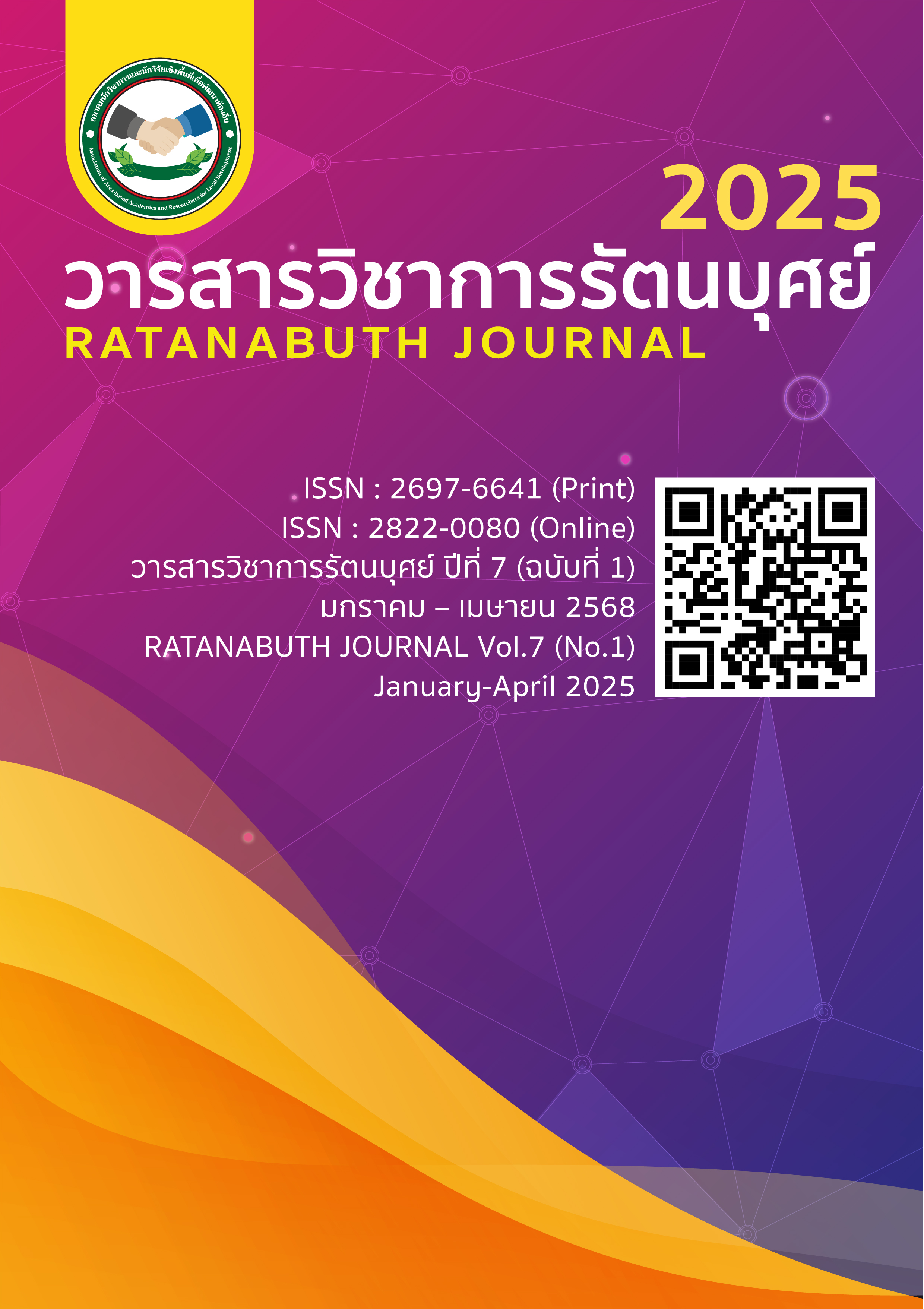Factors Affecting Customers’ Loyalty of Government Savings Bank, Buriram Branch, Buriram Province Factors Affecting Customers’ Loyalty of Government Savings Bank, Buriram Branch, Buriram Province
Main Article Content
Abstract
This research aimed to 1) investigate the factors affecting the customers’ loyalty of Government Savings Bank, Buriram Branch, Buriram Province, and 2) compare the factors affecting the customers’ loyalty of Government Savings Bank, Buriram Branch, Buriram Province, categorized by gender, age, marital status, education level, occupation, and monthly income. This study included a total of 40,694 participants. The sample comprised 396 people, determined using Taro Yamane's formula, with an error of 0.05. Data were collected using an accidental sampling. The tool used to collect the data was a questionnaire comprising three parts: a checklist, 5-point Likert scale, and open-ended questions. The discrimination ranged between 2.09 and 13.73, with a reliability of 0.95. The statistics used in the data analysis were frequency, percentage, mean, standard deviation, t-test, one-way analysis of variance (ANOVA), and post-hoc pairwise comparison test, according to Scheffe’s test.
The findings revealed that: 1. The sample’s opinions on the factors affecting the customers’ loyalty of Government Savings Bank, Buriram Branch, Buriram Province, were overall at a high level. 2. The study comparing respondents' opinions on factors influencing customer loyalty toward the Government Savings Bank, Buriram Branch, found statistically significant differences at the .05 level based on gender, age, marital status, education level, occupation, and monthly income. Significant differences were particularly found in areas such as price sensitivity, reliability, responsiveness, assurance, empathy, word-of-mouth behavior, and purchase intention, while other factors showed no significant differences.
Article Details

This work is licensed under a Creative Commons Attribution-NonCommercial-NoDerivatives 4.0 International License.
References
จุฑามาศ สุดจิต. (2563). ปัจจัยที่ส่งผลต่อความภักดีของบุคลากรของธนาคารพัฒนาวิสาหกิจขนาดกลางและขนาดย่อม สำนักงานใหญ่.วิทยานิพนธ์ปริญญาบริหารธุรกิจมหาบัณฑิต.กรุงเทพฯ: มหาวิทยาลัยรามคำแหง.
ชมพูนุท ศุภฤทธิธำรง. (2563). ปัจจัยที่มีผลกับความพึงพอใจและความจงรักภักดีต่อร้านเครื่องสำอางหลายตราสินค้า (Multi-brand cosmetic store) ของผู้บริโภค Gen X และ Gen Y ในเขตกรุงเทพมหานคร.วิทยานิพนธ์ปริญญาบริหารธุรกิจมหาบัณฑิต.กรุงเทพฯ: มหาวิทยาลัยมหิดล.
ณมน อังคะหิรัญ. (2565). ปัจจัยที่ส่งผลต่อความจงรักภักดีของลูกค้าผ่านความพึงพอใจของลูกค้าของร้านขายส่งสินค้าเบ็ดเตล็ด.วิทยานิพนธ์ปริญญาบริหารธุรกิจมหาบัณฑิต.กรุงเทพฯ: มหาวิทยาลัยศิลปากร.
เดชพงศ์ โพธิสุวรรณ. (2560). ปัจจัยที่มีความสัมพันธ์ต่อความจงรักภักดีต่อองค์กรของพนักงานระดับปฏิบัติการในองค์กรภาคเอกชนในกรุงเทพมหานครและปริมณฑล.วิทยานิพนธ์ปริญญาบริหารธุรกิจมหาบัณฑิต.กรุงเทพฯ: มหาวิทยาลัยกรุงเทพ.
ธงสรวง ศรีธัญรัตน์. (2563). ปัจจัยที่ส่งผลต่อความจงรักภักดีของลูกค้า: กรณีศึกษาร้านก๋วยเตี๋ยวเนื้ออาคเนย์ อำเภอเมือง จังหวัดอุบลราชธานี.วิทยานิพนธ์ปริญญาบริหารธุรกิจมหาบัณฑิต.อุบลราชธานี: มหาวิทยาลัยอุบลราชธานี.
ธนัชพร จินดา. (2563). ปัจจัยที่ส่งผลต่อความจงรักภักดีและการรับรู้คุณค่าเพื่อผู้อื่นของผู้บริโภคต่อร้านกาแฟที่ดำเนินการโดยผู้พิการทางการได้ยินในกรุงเทพมหานครและปริมณฑล.วิทยานิพนธ์ปริญญาบริหารธุรกิจมหาบัณฑิต.กรุงเทพฯ: มหาวิทยาลัยศรีนครินทรวิโรฒ.
ธนาคารออมสิน. (2566). ธนาคารออมสิน. บุรีรัมย์: สำนักงานใหญ่.
Yamane, T. (1973). Statistics: An introductory analysis (3rd ed.). New York: Harper & Row.


